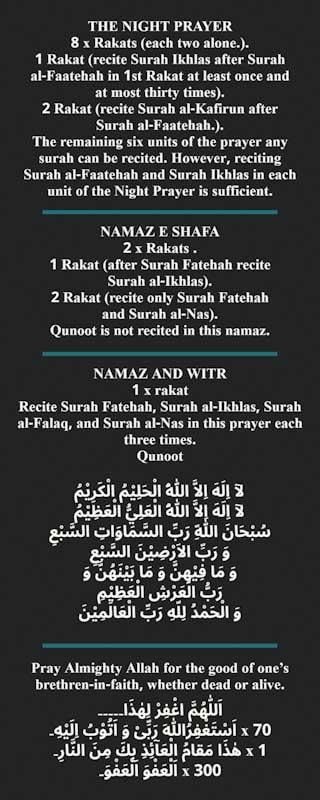Namaz e Shab, also known as Salat al-Layl, is a night prayer that Muslims worldwide perform. The night prayer is considered a time of spiritual reflection and connection with Allah.
This blog post will delve into the significance of Namaz e Shab and how it can benefit those who make it a regular part of their daily routine. I perform it regularly and have noticed an immense change in my personality, which led me to success in ways I would not have imagined myself.
It has numerous spiritual and physical advantages for those just learning about this spiritual prayer (Namaz e Shab). It is prayed in the final part of the night. However, if anyone finds it hard to wake up so early, they can also conduct it for their convenience before bed.
This blog post will discuss ways to perform Namaz e Shab that you will find nowhere else and the benefits it can bring to one’s life. From increasing one’s faith and devotion to improving overall health, wealth and well-being, the benefits of Namaz e Shab are numerous.
So let’s dive in and explore the blessings of Namaz e Shab.
Key takeaways: Benefits of Namaz e Shab.
Imam Jaffar Sadiq shared what Imam Ali said about praying Salat al-Layl. This prayer brings 24 important benefits:
- It makes Allah happy with you.
- You become friends with Angels.
- You follow the example of the Prophets.
- It helps you gain knowledge.
- It is the foundation of our faith.
- It keeps you physically healthy.
- It keeps Satan away from you.
- It protects you from your enemies.
- It makes sure that your prayers and good deeds are accepted.
- It can increase your wealth.
- It speaks on your behalf when you meet the Angel of Death.
- It lights up your resting place in the grave.
- It provides a comfortable resting spot in the grave.
- It helps you answer questions from Munkar and Nakir in the grave.
- It offers companionship in the grave.
- It provides shelter on the Day of Judgment.
- It gives you a special honor on the Day of Reckoning.
- It clothes you on the Day of Resurrection.
- It provides light on the Day of Judgment.
- It acts as a shield against the fires of Hell.
- It earns forgiveness from Allah on the Day of Judgment.
- It makes your good deeds weigh more on the scale.
- It helps you cross the Bridge of “Siraat” without any problems.
- It opens the gates to Paradise.
- Key takeaways: Benefits of Namaz e Shab.
- Overview of Namaz e Shab (Salat al-Layl).
- Benefits of Namaz e Shab
- How to perform Namaz e Shab.
- Additional Du'as for Recitation During Witr Qunoot.
- Additional Resources.
- Perspectives on Salat-al-layl night prayer (Namaz e Shab).
- Daily Night Prayer Practices: Strategies for Consistency (Namaz e Shab).
- Purity in sleep per Prophet's (ﷺ) guidance
- Conclusion.
Overview of Namaz e Shab (Salat al-Layl).
Anas ibn Malik, a Prophet Muhammad (ﷺ) companion, related a statement referred to the Prophet in which he prioritizes the virtue and significance of performing two units of prayer at night. According to reports, the Prophet values this act more than owning all of the world’s wealth and possessions.
Benefits of Namaz e Shab
The Holy Infallibles (a.s.) have defined Namaz e Shab (Night Prayer) as the honor of true faithful believers because it brings them closer to Allah (SWT).
- It brings good health.
- You can erase your sins.
- It saves you from the loneliness in the grave.
- It enhances the look of your face.
- Perfumes the body and creates sustenance.
Imam Ja’far al-Sadiq (a.s), the sixth Imam of Shia Muslims, is known to have emphasized the importance of performing night prayers (Tahajjud) and their spiritual benefits. He is reported to have mentioned that those who perform night prayers will be among the successful on the day of judgment and that it is a means of gaining closeness to God. He also advised me to perform it regularly and to make sure to complete it before the Fajr prayer.
Allah’s slaves have one, two, or perhaps more nighttime awakenings. Satan will lure a servant to miss the night worship if they don’t go. If the believer misses the prayer (obligatory fajr prayer), then Satan opens his legs and urinates in his ear. This is why those who skip night worship in the morning feel sluggish and heavy.
How to perform Namaz e Shab.
Here is a general step-by-step guide on performing the prayer, standing, bowing, prostration, and sitting.

Namaz e Shab.
The time of this prayer (Namaz e Shab) begins after midnight, but it is recommended to perform it as close as possible to the dawn prayer (fajr). Namaz e Shab consists of 8 units; each has to be prayed like the dawn prayer (fajr). Taslims should be said at the end of each Namaz e Shab unit.
To make the intention (Niyyah) for Namaz-e-Shab (Night Prayer), one should silently state in their mind or heart that they want to pray the Namaz-e-Shab and the specific number of Rak’ahs (two in this case).
It is advisable to recite Surah Al-Ikhlas 30 times (if there is time) after Surah-Fatiha in the first Rakat. In the second Rakat recites Surah-al-kafirin after Surah-Fatiha, it is permissible to recite Surah-Fatiha alone if there is no time.
In the other six units of Namaz-e-Shab, one can recite any Surah of their choice, and it is acceptable to recite Surah-Fatiha and Surah-Ikhlas in every unit.
Namaz-e-Shafa.
The Shafa prayer is a two-unit prayer performed after completing the eight-unit Night Prayer (Tahajjud). It consists of two Rakats, and in the first Rakat, you recite Surah al-Ikhlas or Surah al-Falaq after Surah Fatehah.
In the second Rakat, you recite only Surah Fatehah and Surah al-Nas, and Qunoot is not recited in this prayer. After completing the prayer, recite Tasbeeh e Janab e Fatima (s.a.) and make supplications to Allah, as this is considered the right time for the grants of prayers. After performing Sajdah e Shukr, recite Namaz e Witr.
Namaz-e-Witr.
The prayer consists of only one Rakat and includes reciting Surah Fatehah, Surah al-Ikhlas, Surah al-Falaq, and Surah al-Nas, each of them three times or if time is less, one time would be sufficient. It also includes reciting a specific supplication known as Qunoot, and it is recommended to weep in fear of God and pray for the good of one’s fellow believers.

It is advisable to recite Astaghfirullah seventy times for the good of one’s family members or brother in faith, whether dead or alive.
Recite with your hands in the Qunoot Position.
1- Recite Astaghfir-Ullaha Rabbi wa Atoobo Ilaih 70 times.
2-Recite 40 names of male or female believers, each preceded by Allah-hom maghfirli.
If reciting 40 names is difficult, recite “Allah-hoom maghfirli momineen wal mominaat.
3-Recite “Al-Afv” 300 times.
4- Finish the prayer with Rukoo, Sajadah, and Salam.
Recite with your hands in the Qunoot Position.
1- Recite Astaghfir-Ullaha Rabbi wa Atoobo Ilaih 70 times.
2-Recite 40 names of brethren in faith, each preceded by Allah-hom mughfirlil.
If reciting 40 names is difficult, recite “Allah-hoom mughfirlil momeneen wul momeenat.
3-Recite “Al-Afv” 300 times.
4- Finish the prayer with Rukoo, Sajadah, and Salam.
Additional Du’as for Recitation During Witr Qunoot.
Additional Resources.
Surah Al-Isra 17:79
And arise during the night as well. Here is yet another prayer for you. Allah will elevate you to a position of honor.
Surah Al-Lail (92:1-21)
Allah will undoubtedly be pleased with him. (2) Allah will soon bless this man and make him happy. (Are) unquestionably diverse. (92:4) Your goals are undoubtedly divergent.
Adh-Dhariyat (51: 15-18)
Indeed, the righteous will dwell among gardens and springs; they used to sleep only a few hours at night and pray for forgiveness before dawn. They will joyfully accept whatever their Lord will grant them. They were good people in the world before this reward.
Az-Zumar (39: 9)
And establish prayer at the start of the night and the two ends of the day. Indeed, good acts drive out evil. For those who remember, that will serve as a reminder.
This verse emphasizes the importance of constant prayer, including establishing the night prayer. The verse also mentions the benefits of worship, including that good deeds can erase misdeeds.
Surah Al-Muzzammil (73:20)
And maintain your patience by being kind to those who pray to their Lord in the morning and the evening to see his face. And do not follow someone whose heart we have rendered ignorant of our remembrance, who follows his desires, and whose affairs are perpetually neglected. Also, do not let your eyes wander beyond them, coveting the adornments of worldly life.
This verse mentions the importance of being patient and persistent in prayer, including the night prayer. The verse encourages Muslims to focus on seeking the pleasure of Allah rather than being distracted by worldly life and material possessions.
Surah Al-Sajdah (32:16)
And who have hoped they have faith in the reunion with their Lord, fear the punishment of the afterlife, and remain steadfast in facing adversity.
They have established the prayer, have spent from what We have given them secretly and publicly, and have repulsed evil with good. Those will have the final abode.
This verse highlights the characteristics of true believers, including establishing the habit of praying regularly the night prayer. The verse also mentions other virtuous qualities such as patience, giving in charity, and doing good deeds, which are all essential aspects of a Muslim’s faith and practice.
Perspectives on Salat-al-layl night prayer (Namaz e Shab).
The Holy Prophet (ﷺ)
There is undoubtedly a time throughout the night when a submissive person can beg Allah for anything they want for both this life and the next, and that time is the entire night.
Bukhari, Muslims, and Tirmidhi mention night prayer.
Yes, the hadiths (sayings of Prophet Muhammad ﷺ) about Namaz e Shab are recorded in several books, such as Sahih al-Bukhari, Sahih Muslim, and Sahih al-Tirmidhi. These are some of the most authentic collections of hadiths and are widely referenced and used by scholars worldwide. I have quoted some of the sayings about Namaz e Shab from these books.
Sahih al-Bukhari
The best and most recommended prayer after the mandatory prayers is the namaz e Shab (Night prayer).
Sahih Muslim.
It is among the virtuous acts and advises us not to neglect the night prayer because it was the regular practice of the righteous before you, and indeed it brings you closer to Allah.
Sahih al-Tirmidhi
The Hadith quotes from Sahih al-Tirmidhi highlight the importance of praying Namaz e Shab regularly, if not regularly, then once a year at least.
It is said that those who perform it regularly are as if they have given one-third of their life in worship of Allah. This Hadith focuses on the nearness of the almighty Allah and the rewards it can bring.
Nisai and Tirmidhi
The Hadith quotes from Nisai and Tirmidhi focus on the importance of remembering Allah at night. It is an exceptional opportunity for every faithful believer to connect with their Lord.
This Hadith emphasizes the spiritual significance of the night prayer and the rewards it can bring to those who perform it regularly.
The saying of the Prophet (peace be upon him) serves as a reminder of the importance of this act of worship in Islam and its benefits for the individual’s spiritual development.
Daily Night Prayer Practices: Strategies for Consistency (Namaz e Shab).
Always remember that “Kullu Nafsin Zaikatul Maut” Death is unavoidable, and actual compensation for actions will only occur on Judgment Day. Those freed from Hellfire and granted entrance into Paradise will have won a great victory because life on Earth is only a fleeting illusion.
Whoever has prayed Namaz e Shab once, it is doubtful that he would not want to pray it for the second time, speaking from my own experience.
Those who know the virtues of performing Namaz e Shab will be keen to express their feelings to Allah (the most gracious and all-knowing).
Consistency is the key to success; in this busy life, it is pretty hard to wake up that early every morning, and most of the time, I have missed Fajr Salah, let alone Namaz e Shab.
I have noticed those days when I assess my actions and can say I haven’t done any sin or less compared to the regular days; waking up for Namaz e Shab is easy.
Therefore, evaluate your deeds daily, try to improve them, and implement them accordingly. It has also improved my personality and made me a regular to Namaz e Shab.
The Prophet (ﷺ) taught his followers to sleep on their right side. According to our beloved Imam al-Mahdi (may Allah hasten his appearance), is that the heart is located on the body’s left side, so if a person lies on the left side, he will sleep comfortably, which may be the reason for oneself not wake up early for Namaz e Shab (Bukhari & Muslim).
Purity in sleep per Prophet’s (ﷺ) guidance
The Prophet ﷺ said, When one of you goes to bed, he must shake out his bed because he has no idea what has gotten onto it since he left it. Then he should perform Wudu (ablution) as he would for prayer (Bukhari).
Allah will purify you, which means those of you who go to bed in a state of purity. Allah assigns an angel that spends the night with him, and every time in sleep he turns over, the angel will ask Allah (The Bestower of Mercy) O Allah forgive your slave (Reported by al-Tabaraani).
It is recommended to perform Adhkar (words of remembrance of Allah) before going to bed. These Adhkar will protect you from evil imaginations from the Shaytaan and help you get up for namaz e Shab. Some of the Adhkar mentioned in the Hadith are:
- “In the name of Allah, I live and die.” (Sahih Bukhari)
- Recitation of Surahs Ikhlas, Falaq, and Naas three times.
- The final two verses of Surah al-Baqarah.
- Recitation of Ayat Al Kursi.
- Recitation of 33 times “Subhaan Allah,” 33 times “Al-hamdu Lillaah,” and 34 times “Allahu Akbar.”
- Recitation of Surah Kafiroon as reported by al-Bayhaqi.
- Recitation of Surah Mulk, which will intercede for the reciter until forgiveness is granted. (Tirmidhi & Abu Dawood)
- Other recommended recitations can be found in the book “Hisnul Muslim.”
Surah Al-Tin

Conclusion.
Dear brothers and sisters! Man is weak by nature. He can only have strength once he submits to Allah. The power of Namaz e Shab is that evil forces, lustful desires, and various challenges are all opposed from all sides by the individual. Returning to Allah and seeking refuge with Him is the sole solution to these issues. Our souls get stronger when we perform dhikr and obey Allah.
It is an act of self-control and spiritual cleansing that increases one’s empathy for the less fortunate. Namaz e Shab strengthens the heart. Namaz e Shab increases one’s physical strength and keeps away the Shaitan. This is how to be closer to Almighty Allah to reap the worldly and afterlife benefits.
I would 100% recommend this prayer to everybody because I have seen the benefits and changes it got in my life since I started praying this wonderful prayer (Namaz e Shab).

Hey there, Author Extraordinaire! ???? Just finished diving into your piece on the 24 Benefits of Namaz-e-Shab, and I must say, what a captivating journey it was! Your eloquence in describing the serene beauty of Salat al-Layl truly struck a chord. It’s like you painted a vivid picture with words, allowing me to feel the solace in each prayer mentioned.
Your insights on the spiritual and mental benefits were particularly enlightening. It’s incredible how something as profound as the night prayer can bring such peace and clarity to our lives. Your words acted as a gentle reminder of the power that lies within these spiritual practices. I found myself nodding along, realizing how much more there is to the act of Namaz-e-Shab than meets the eye.
Moreover, your personal touch, and sharing your own experiences, made the entire piece feel authentic and relatable. It’s not just about the benefits; it’s about the personal connection one can establish during those quiet moments of prayer. Kudos to you for not just informing but also inspiring. Looking forward to more of your soul-nourishing pieces! Keep spreading the light! ✨
Learn Quran Online
Thank you so much for your heartfelt and encouraging words!